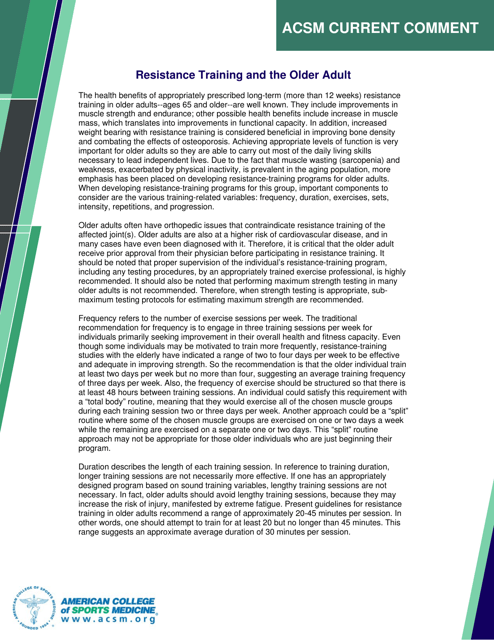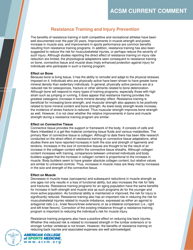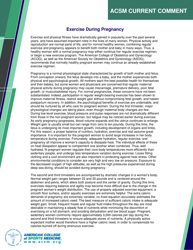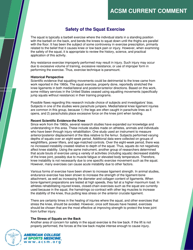Acsm Current Comment: Resistance Training and the Older Adult - American College of Sports Medicine
The Acsm Current Comment: Resistance Training and the Older Adult by the American College of Sports Medicine is intended for providing information and guidelines for incorporating resistance training exercises into the exercise regimen of older adults.
The "Acsm Current Comment: Resistance Training and the Older Adult - American College of Sports Medicine" is typically filed by the American College of Sports Medicine.
FAQ
Q: What is the ACSM?
A: The ACSM stands for the American College of Sports Medicine.
Q: What is the importance of resistance training for older adults?
A: Resistance training is important for older adults as it can help improve muscle strength, bone density, balance, and overall function.
Q: What are the benefits of resistance training for older adults?
A: The benefits of resistance training for older adults include improved muscle strength, increased bone density, better balance, enhanced cognitive abilities, and reduced risk of chronic diseases such as osteoporosis and diabetes.
Q: How often should older adults engage in resistance training?
A: Older adults should engage in resistance training exercises at least two days a week, targeting all major muscle groups.
Q: What are some examples of resistance training exercises for older adults?
A: Examples of resistance training exercises for older adults include lifting weights, using resistance bands, performing bodyweight exercises, and using weight machines.
Q: Is resistance training safe for older adults?
A: Yes, resistance training can be safe for older adults when performed correctly with appropriate supervision and guidance.
Q: Are there any precautions older adults should take when starting resistance training?
A: Yes, older adults should consult with their healthcare provider before starting any exercise program, including resistance training, to ensure it is safe for them.
Q: Can resistance training help prevent falls in older adults?
A: Yes, resistance training can help improve balance and strength, reducing the risk of falls in older adults.
Q: What are some tips for older adults to get started with resistance training?
A: Some tips for older adults to get started with resistance training include starting with light weights or resistance bands, gradually increasing intensity, listening to their body, and seeking guidance from a qualified fitness professional.
Q: How can older adults maintain consistency with resistance training?
A: To maintain consistency with resistance training, older adults can consider finding a workout buddy, joining a group exercise class, setting realistic goals, and scheduling regular sessions in their weekly routine.









